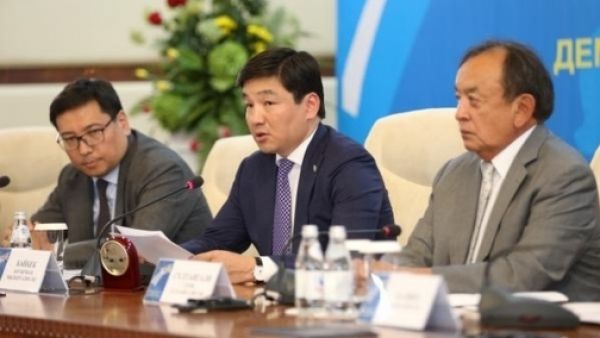ASTANA – Members of the National Coalition of Democratic Forces met June 19 to discuss the importance of the participation of civil society in implementing the Plan of the Nation. Representatives of leading political parties, members of the government, parliament deputies and heads of NGOs attended the session.
Nur Otan Party First Deputy Chairman Baurzhan Baibek opened the meeting by touching on the five institutional reforms announced by President Nursultan Nazarbayev as his elected platform at the party’s 16th congress.
“Because of the urgency of the reforms, the Plan of the Nation was almost immediately published; it is a framework that needs to be filled by practical measures. The five reforms are the logical continuation of the ongoing state policy of our President that allowed the country to achieve impressive success,” said Baibek. He added the changes create an institutional foundation for the country’s entry into the list of 30 most developed countries in the world and provide radical improvement in the quality of life of Kazakh citizens.
According to the deputy chairman, all the necessary conditions have been created for the effective implementation of the planned reforms. He stressed that the ruling party is actively involved in this work. Thus, Nur Otan is planning to initiate and push for the adoption of 15 draft laws, including those on public control, access to information and combating corruption. The party will also be implementing the roadmap project, which includes a large package of concrete proposals similar to the Plan of the Nation. In addition, Nur Otan adopted a political doctrine and anti-corruption programme until 2025.
In order to execute the five institutional reforms, Nazarbayev established the National Commission on Modernisation. Kazakh Minister of National Economy and national commission member Yerbolat Dossayev described the work which is being accomplished by the commission.
The minister recalled the focus of each reform and spoke about the current situation. He pointed out that much of work is being undertaken in social modernisation, such as a complete reform of the employment relationship (a new labour code to be developed during the summer in accordance with the standards of the developed countries and Organisation for Economic Co-operation and Development) and introduction of targeted social assistance. The fourth reform includes implementing several major projects, such as social and cultural tourism, the ideas of Mangilik Yel (Eternal Nation) and introducing its values to the existing school curriculum.
According to Dossayev, the work to create the legal statute for implementing the institutional reforms is expected to be completed by the end of August. By the beginning of the new parliamentary session in September, the complete package of draft laws will be submitted to Parliament, allowing the deputies to review it in the autumn cycle.
“With the implementation of the five institutional reforms, we expect consistent changes to be carried out with the participation of those who are concerned about the fate and future of Kazakhstan. Knowing work on the fifth reform for certain, I can say that not only deputies and representatives of government agencies are actively involved in it, but the non-governmental sector as well,” said Mazhilis Deputy Nurlan Abdirov.
Speaking of the 100 steps, Abdirov mentioned that society pays great attention to the development of the law on access to information. Work on the document is underway and the framework includes a proposal to expand the list of entities that are obliged to provide information to the public. The groups would not only be state bodies and institutions, but also subjects of the quasi-public sector, recipients of budget funds, market entities with a dominant or monopolistic position and separate legal entities.
“The National Commission on Modernisation aims at making government as open as possible to the public,” he added.
In turn, chief researcher at the Kazakhstan Institute for Strategic Studies under the President Yuriy Buluktayev suggested that a state can be transparent only if it has a strong and active civil society. The scholar proposed creation of the institute of civil expertise, which could attract experts and scientists from different areas of society.
Lawyer and member of the public council under the Kazakh Ministry of Internal Affairs Irak Yelekeev focused on the second reform in his speech, in particular stressing the importance of a step such as the tightening of qualification requirements and mechanisms for the selection of candidates for judicial office. He also stressed the special significance of the work to strengthen public confidence in the courts and law enforcement agencies.
“No doubt the Plan of the Nation’s 100 concrete steps is a unique, timely and important document. It accurately determines directions for further movement of Kazakh society. Civil society has to start its participation in the implementation of the tasks with transformation of their relationship with their target groups, the state and within themselves,” noted director of the Institute for Democracy Yulia Kuchinskiy.
The sociologist stressed that a broader and more effective public awareness is necessary on the activities of the country, but it needs to be as clear and accessible as possible. She added that implementing the five reforms requires a new mindset and thinking from society which needs to be started in school.
The conversation during the meeting was active and constructive, as the experts incorporated specific proposals in their speeches and comments. All the information related at the meeting will be reflected in the record, as well as in recommendations for the authorities.
Following the meeting, members of the coalition adopted an appeal to the citizens of the country.
